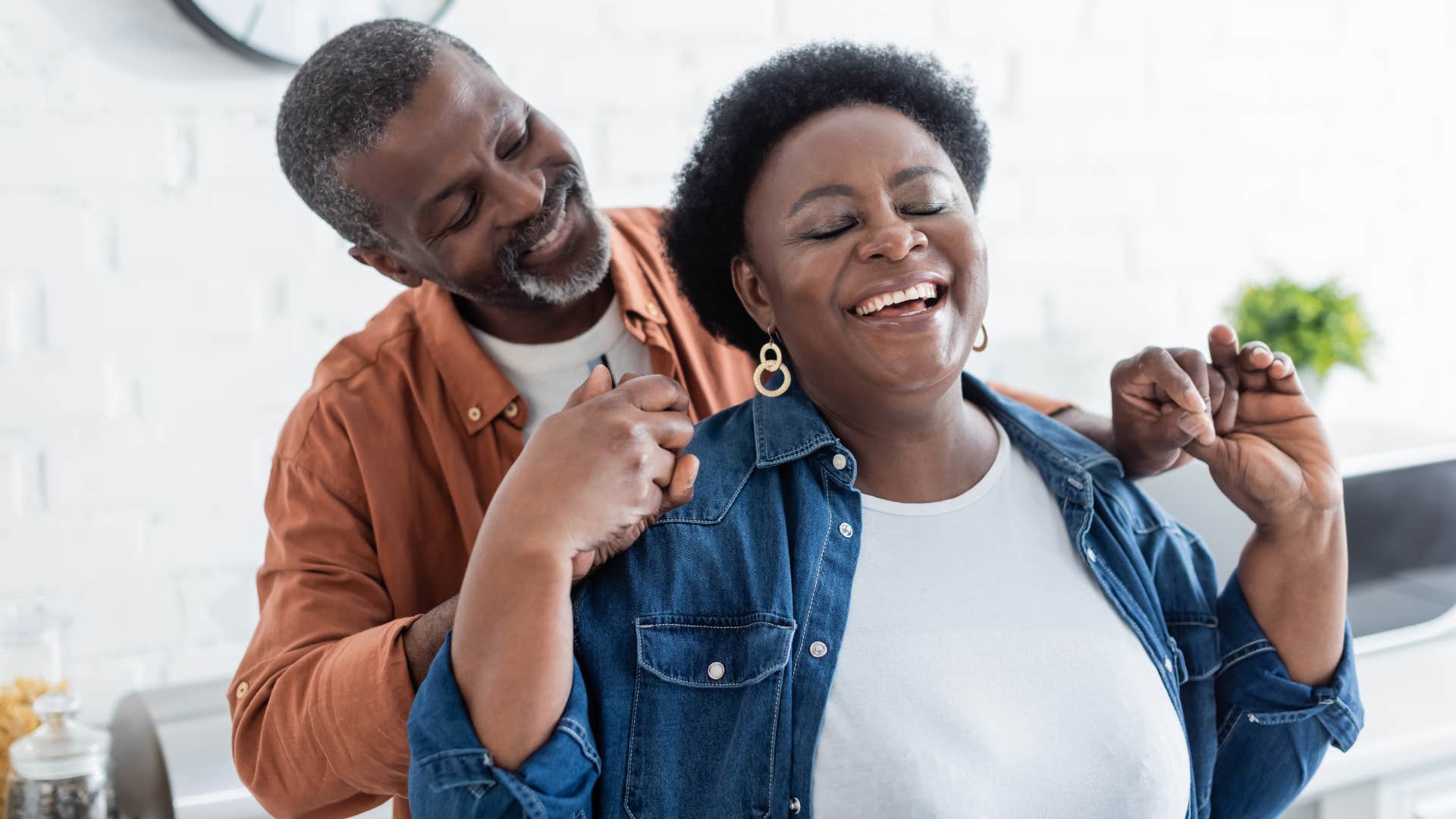If A Woman Has Quietly Stopped Loving Her Husband, She'll Avoid Saying These 11 Things
She's sick of putting in effort for someone that just doesn't care.
 YAKOBCHUK VIACHESLAV | Shutterstock
YAKOBCHUK VIACHESLAV | Shutterstock Falling out of love and coming to terms with the fact that a relationship is no longer meant for you can be a disillusioning, frustrating and, at times, completely empowering feeling. There's no "right" or "wrong" way to handle it, but there are certain things that partners tend to avoid when they're coping with internal dysregulation about a marriage or long-term relationship.
As a study from Frontiers in Psychology explains, disengagement, lost intimacy, and negative communication shifts are all common for people falling out of love. But even small things — from passing phrases to casual comments — can be a sign of lost romantic attraction. From subtle questions like "What do you think?" to blatant phrases like "I love you," if a woman has quietly stopped loving her husband, she'll avoid saying these things.
If a woman has quietly stopped loving her husband, she'll avoid saying these 11 things
1. 'How can I help?'
 Chay_Tee | Shutterstock
Chay_Tee | Shutterstock
Things like emotional pain, a lost sense of self, and dwindling intimacy are all things that tend to spark a loss of romantic love in marriages, according to a 2013 study, so it's not surprising that seemingly insignificant things like offering a helping hand on a stressful day are things unhappy wives avoid entirely.
They're more focused on protecting themselves and trying to make sense of their emotional dysregulation than showing up for a person who's not putting in effort themselves. Even doing extra chores to help their husbands or offering emotional support when they're struggling to be vulnerable can be draining in an entirely new way when there's also been a loss of love.
2. 'I'm sorry'
 fizkes | Shutterstock
fizkes | Shutterstock
Confrontation, resolving conflict, and genuinely apologizing can be a struggle for happily married couples — they're not always easy or fun conversations to have. However, for someone who's no longer interested in maintaining closeness with a partner or mending broken bridges, they may overlook the need for apologies, in general.
If a woman has quietly stopped loving her husband, she'll avoid saying things like "I'm sorry" altogether. They'd prefer to protect their peace, even at the expense of clarity, honesty, and growth in their marriage.
3. 'We'll figure it out together'
 fizkes | Shutterstock
fizkes | Shutterstock
A couple's ability to collaborate, work together, and communicate through hardships is often a predictor of their relationship happiness and satisfaction, according to a study from the Journal of Marriage and Family. Phrases like "We'll figure it out together" or "I'm always here to support you" are powerful ways to support one another, even in the face of a disagreement or concerns.
However, if a woman has quietly stopped loving her husband, she'll avoid saying these things altogether — caring less about coming together, and more about protecting herself. If she doesn't envision a future with her partner anymore, why drain her energy trying to resolve conflicts and put herself in the face of disrespect?
4. 'I forgive you'
 fast-stock | Shutterstock
fast-stock | Shutterstock
When a woman loses respect and romantic love for her husband, she's much less likely to lean on apologies, gratitude, and forgiveness for comfort. There's no coming back from certain conversations, comments, and actions, so why "forgive and forget," especially at the sake of her own self-esteem and well-being?
Like a study from the Journal of Family Psychology suggests, partners who forgive each other more often reap more positive and fulfilling experiences. However, forgiveness isn't always the key to mending a broken marriage, especially if it's only urging couples to suppress and ignore their own internal feelings and concerns.
5. 'I was thinking about you today'
 PeopleImages | Shutterstock
PeopleImages | Shutterstock
If a woman has quietly stopped loving her husband, she'll avoid saying things like "I was thinking about you today," whether it's in person at home or over a random call during work. She's not avoiding these phrases because she didn't spend all day fretting over the relationship, but rather because "checking in" and offering appreciation to her partner doesn't feel worth the effort any longer.
Of course, words of affirmation and quality time are important, but check-ins throughout the day can also be casually profound.
6. 'You're my best friend'
 ORION PRODUCTION | Shutterstock
ORION PRODUCTION | Shutterstock
According to a study from the Journal of Social and Personal Relationships, people who marry and stay in long-term relationships with their best friends are often happier than those who don't. They have a built-in best friend no matter what, so of course they're happier, more fulfilled, and boast more consistent routines.
But when the challenges of life, personal strains, and disrespect rattle the core of a relationship, a woman who's stopped loving her husband will probably avoid naming him as her "best friend." Friends should be respectful and care about putting effort into their relationship, but the loss of romantic love often signifies something entirely different.
7. 'Thank you'
 LightField Studios | Shutterstock
LightField Studios | Shutterstock
Expressing gratitude is a positive element of many different relationships, whether it's romantic, platonic, or professional. It's a means of showing someone that you truly care and appreciate them, even in the most chaotic and challenging times in life.
Gratitude expressions and acts of thankfulness help partners to find and remind themselves of their spouse's potential, according to a study from the Journal of Positive Psychology. By expressing gratitude in everyday life, even by simply saying "thank you," they bond with each other closer under a shared feeling of appreciation.
However, if a woman has quietly stopped loving her husband, she may overlook the importance of these moments and even feel less empowered to share them with her partner.
8. 'I love you'
 Drazen Zigic | Shutterstock
Drazen Zigic | Shutterstock
Simple verbal expressions of love like "I love you" are more profound than they seem. Especially when paired with eye contact and physical affection, like a study from Computers in Human Behavior suggests, boosts intimacy and connection, these kinds of phrases can be powerful for bringing partners closer together.
However, when a wife loses love for her partner and avoids these phrases, it may be subtle at first, but eventually their partner will feel disconnected and unseen.
9. 'What do you think?'
 DexonDee | Shutterstock
DexonDee | Shutterstock
Even subtle things like asking for her husband's opinion are one of the ways a wife shows love. If she values his opinion, advice, and insight enough to go out of her way to ask for it, she probably also loves and respects him.
But if a woman has quietly stopped loving her husband, she'll likely avoid saying things like "What do you think?" or "Can I ask for your opinion?" She's started framing her entire routine and decision-making process around herself, especially in the face of lost respect or affection with her partner.
10. 'I'll take care of it'
 BearFotos | Shutterstock
BearFotos | Shutterstock
Whether it's taking on an unbalanced share of household chores, doing invisible cognitive work like planning his schedule, or even offering a small act of kindness on a hard day, saying things like "I'll take care of it" is sometimes a way for partners to show love to each other. It's a moment of understanding and affection, where one person puts in extra effort to show how much they care.
However, if a woman has lost romantic love for a husband, she may be less empowered and motivated to take on more work or spend more of her energy accommodating him, even if it's subtle at first.
11. 'I miss you'
 carlesmiro | Shutterstock
carlesmiro | Shutterstock
Even subtle things, like checking in with a partner on your phone during the workday or calling them to say "I miss you" when you're apart, play a huge role in boosting relationship satisfaction, happiness, and health.
But they become less convenient and empowering when you're with someone who doesn't truly fill your cup or make you feel loved. These small actions become draining and filled with resentment, which is why a wife who has quietly stopped loving her husband generally avoids saying these things.
Zayda Slabbekoorn is a senior editorial strategist with a bachelor's degree in social relations & policy and gender studies who focuses on psychology, relationships, self-help, and human interest stories.

